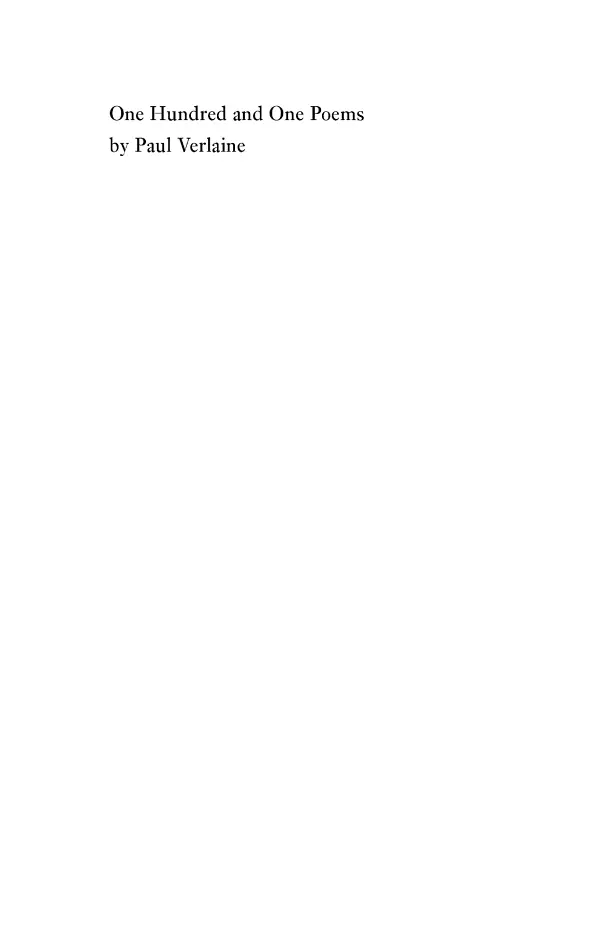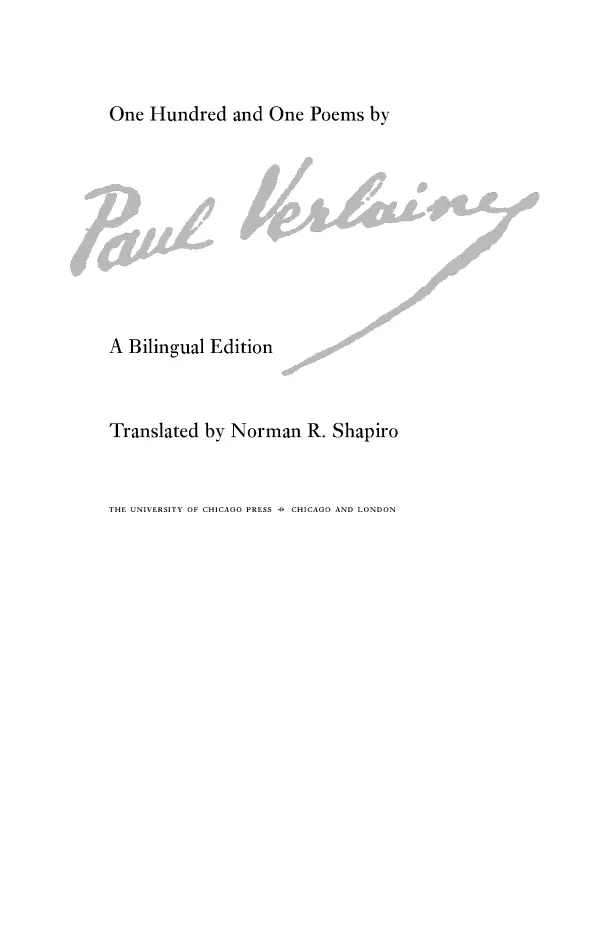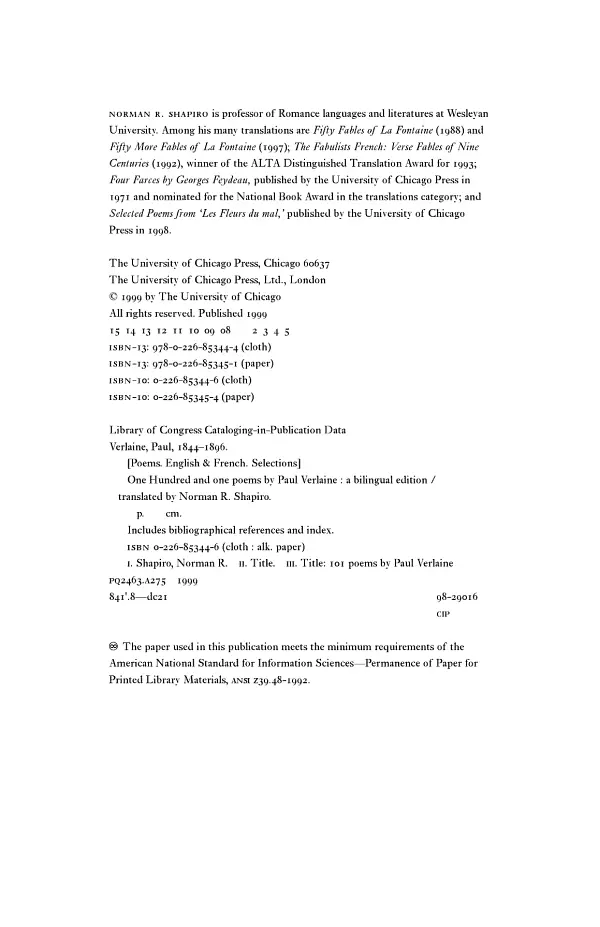One Hundred and One Poems by Paul Verlaine

![[graphic]](/a/1969082/images/000014.webp)


For Sylvia and Allan Kliman,
for their encouragement, concern, and affection
Illustrations
![[graphic]](/a/1969082/images/000003.webp)
Preface
A good many years ago, as an undergraduate, I concocted a paper on Paul Verlaine, one of my favorite poets then as now. And rightly so. But good aesthetic judgment does not necessarily make for good academic writing; and over the years I have continued to feel a little guilty at having been graduated from a prestigious institution of higher learning with a senior essay that, my then professors’ opinions to the contrary notwithstanding, strikes me as having reflected little credit on me and not much more on Verlaine. To salve my conscience after all this time, I would like to consider the present volume as something of a belated expiatory offering (in retrospect, and with the improved vision of hindsight) both to myself and to him. Or at least to his memory.
This is a collection of translations; English versions of poems by one of France’s, and western literature’s, most gifted and prolific poets. It is not a dissection, a literary study purporting to analyze his verse according to the canons of this or that critical “ism,” traditional or modish. And it is certainly not a detailed biography. Any good encyclopedia article on Verlaine will acquaint the reader with the salient facts of his tormented life and of his artistic role in the development of French poetry. Which is not to say that his biography is unimportant to an understanding of his work in general and of specific works in particular. On the contrary. Though we were assured, not many decades ago, that biography is irrelevant to an aesthetic appreciation of “the poem itself”—or, indeed, of any literary work—I never believed it. And while the New Criticism fades with age to become, today, with a trace of a smirk, “the old New Criticism,” others are coming out of the critical closet to admit that they never really believed it either.
In Verlaine’s case, while it is possible, even easy, to appreciate in vacuo the medium of his verse—its varied forms, its flexible rhythms, its lush musicality—it is quite another matter for his messages. Not to know the circumstances that surrounded and gave birth to his poems is, in many cases, really not to comprehend them, in the fullest etymological sense of that verb. This is true even for his more “universal” but often heavily allegorical poems of religious fervor, rather few of which I include, preferring by far the more idiosyncratic earlier and later works (many, if not most, of the latter, usually neglected, being translated here for the first time). I think that the brief headnotes to each section of this volume, as well as the notes to many of the individual translations, will provide the reader with enough of that indispensable or ancillary biographical background to meet this need, at least in its essentials.*
these translations were written during the summer and fall of 1997, but the inspiration for them goes back many years. Indeed, many decades. I am happy to express my gratitude to Seymour O. Simches, who, the first to introduce me to the wonders of Verlaine and his melodious genius, nurtured and channeled that inspiration—though, at the time, surely neither he nor I suspected that this volume would be the result. I am grateful to him, both for his past role and for his many years of encouragement; and, likewise, to friend
*The French texts reproduced in this volume are taken from a 1968 printing of Jacques Borel’s substantially augmented 1962 revision (Paris: Gallimard, 1962) of Yves-Gérard Le Dantec’s definitive edition of Verlaine’s Œuvres poétiques complètes, in the series Bibliothèque de la Pléiade (Paris: Gallimard, 1948).
Willis Barnstone, for his much more recent role in reviving my inspiration with a suggestion, albeit offhandedly proffered, that Verlaine would be a worthy subject to follow on the heels of my recent Baudelaire collection.
With this volume, no less than with all my incursions into verse translation, the example of my late mother’s poetic talents has continued to inspire as well. I think that, thanks to her, I learned to spout rhymes in iambs and trochees almost before I learned to speak prose.
My thanks to Wesleyan University for its support of my endeavors, including a grant from the Thomas and Catharine McMahon Fund, established through the generosity of the late Joseph McMahon; to Adams House, Harvard University, under the aegis of Robert and Jana Kiely, and Vicki Macy, for offering a generous hospitality that has made much of my past and recent work possible; to Steve Sylvester and the staff of the Imaging Studio Services of Widener Library; and to Morris Philipson and Randolph Petilos of the University of Chicago Press for their confidence and patience, as well as to Russell Harper for his editorial skills.
Again, as with my other volumes, a number of good friends have been especially helpful. To Lillian Bulwa, Carla Chrisfield, Rita Dempsey, and Caldwell Titcomb, my sincere appreciation for their varied contributions to this endeavor.
And to Evelyn Singer Simha, who, as so often in the past, has given, without stint, of her warm heart, sharp ear, and sound judgment, a very special “thank you.”
—Norman R. Shapiro
from Poèmes saturniens (1866)
Whether, as a youth of twenty-two, Verlaine truly felt himself to have been born under the malevolent sign of Saturn, foreboding, this early in his life, of the dual nature of his conflicted personality, or whether this was only the aesthetic, self-indulgent posturing of an adulator of Baudelaire and his “flowers of evil,” the fact is, his Poèmes saturniens really have very little “saturnine” about them except for the volume’s title and a brief self-conscious liminary poem. His first collection to see print (though it does not include all his earliest verse), it was brought out in 1866, ostensibly by well-known Paris publisher Alphonse Lemerre, but actually subsidized by the young poet himself, thanks to the generosity of a doting female cousin whose death, a few years later, was to affect him deeply.
The collection, comprising four groupings entitled Melancholia, Eaux-fortes (Etchings), Paysages tristes (Sad Landscapes), and Caprices, as well as a dozen miscellaneous poems, brought together products of Verlaine’s early years as a frequenter of the salon of the Marquise de Ricard and other social venues, where he rubbed shoulders with prominent artistic figures of the day, the likes of Anatole France, Emmanuel Chabrier, inventor-poet and humorist Charles Cros, the cynical antibourgeois idealist Auguste de Villiers de l’Isle-Adam, and, especially, the then important poets Théodore de Banville, François Coppée, José-María de
Heredia, Leconte de Lisle, and Catulle Mendès, all of whom were to leave their mark.
![[graphic]](/a/1969082/images/000004.webp)
While the predominant poetic taste and style of the period glorified the impassivity and pictorial impersonality of the so-called Parnassians, who took their name from the several successive volumes of Le Parnasse contemporain, and although Verlaine, eager to espouse that prevailing “art for art’s sake” ethos, managed to follow it up to a point and for a time, he was quite unable to rein in his innately lyrical and self-revelatory genius for long. Be it in neatly crafted sonnets, a form inherited from the past and transmitted by the idolized Baudelaire, or be it in free-form, lushly sonorous vignettes of his own confection, Verlaine’s Poèmes saturniens offer the emerging poet’s synthesis of the cerebral and the visceral, the descriptively objective and the melancholically subjective, the aesthetically detached and the personally involved, and already show his great range of formal, visual, musical, and sentimental artistry.
Mon Rêve familier
Je fais souvent ce rêve étrange et pénétrant
D’une femme inconnue, et que j’aime, et qui m’aime
Et qui n’est, chaque fois, ni tout à fait la même
Ni tout à fait une autre, et m’aime et me comprend.
Car elle me comprend, et mon cœur, transparent
Pour elle seule, hélas! cesse d’être un problème
Pour elle seule, et les moiteurs de mon front blême,
Elle seule les sait rafraîchir, en pleurant.
Est-elle brune, blonde ou rousse?—Je l’ignore.
Son nom? Je me souviens qu’il est doux et sonore
Comme ceux des aimés que la Vie exila.
Son regard est pareil au regard des statues,
Et, pour sa voix, lointaine, et calme, et grave, elle a
L’inflexion des voix chères qui se sont tues.
My Familiar Dream
Often I dream this poignant fantasy,
Strange, of a woman never met, but who
Loves me, and whom I love, and who seems new
Each time and yet who seems the same; and she
Loves me, and understands the mystery
Clouding my heart, as no one else can do;
And who, alone, with tears fresh as the dew,
Soothes, cools my pale and fevered brow for me.
Her hair? Red, blond, or brown? I don’t know which.
1 comment